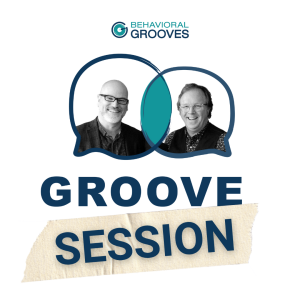
Stories, science and secrets from the world’s brightest thought-leaders. Behavioral Grooves is the podcast that satisfies your curiosity of why we do what we do. Explanations of human behavior that will improve your relationships, your wellbeing, and your organization by helping you find your groove.
Stories, science and secrets from the world’s brightest thought-leaders. Behavioral Grooves is the podcast that satisfies your curiosity of why we do what we do. Explanations of human behavior that will improve your relationships, your wellbeing, and your organization by helping you find your groove.
Episodes

Thursday Aug 28, 2025
Eight Years Grooving: Value of an Open Mind | Jonathan Malesic (Republish)
Thursday Aug 28, 2025
Thursday Aug 28, 2025
This October, we’re celebrating 8 years of Behavioral Grooves! To mark the occasion, we’re digging into our archives and re-sharing some of our most popular and thought-provoking conversations every Thursday for the next two months.
The celebration builds to our Anniversary Event on October 16th in Minneapolis, where fan favorite Nick Epley will lead the audience in a live social experiment and conversation about the science we all love.
🎉 Space is limited—grab your tickets now through the link in the show notes and join us for an unforgettable night of behavioral science, connection, and fun!
Now, onto our first episode in the countdown - Value of an Open Mind with Jonathan Malesic!
Writer and philosopher Jonathan Malesic explores the dangers of “knowingness”—our tendency to act like we already understand something when we don’t—and how it stifles learning, politics, and even science communication. Drawing on his experience teaching writing, Jonathan argues that writing is not just about words on a page but about cultivating empathy and moral imagination. We also dive into the rise of AI tools like ChatGPT and why, despite their usefulness, they can’t replace the human capacity to truly connect with an audience. Together, we unpack what it means to stay humble, keep learning, and communicate more meaningfully in a noisy world.
Links
Behavioral Grooves LIVE in Minneapolis!
The End of Burnout: Why Work Drains Us and How to Build Better Lives by Jonathan Malesic
Music Links

Monday Aug 25, 2025
Everything You’ve Heard About Screen Time Is Wrong | Jay Vidyarthi
Monday Aug 25, 2025
Monday Aug 25, 2025
Jay Vidyarthi blends Silicon Valley design expertise with mindfulness practice to show how you can “fight design with design” and create a healthier, more joyful relationship with your tech. Instead of guilt or digital detoxes, he offers strategies for reframing boundaries into rituals, focusing on what’s good about your devices, and making intentional use easy by shaping your environment.
Topics
[0:00] Introduction and Speed Round with Jay Vidarthi
[9:40] Reconciling Tech and Mindfulness
[15:26] Practical Strategies for Managing Tech
[25:00] The Importance of Tech Design
[32:28] The Impact of AI
[38:18] Self-Awareness to Prevent Burnout
[47:00] Embracing Uncertainty
[50:39] Desert Island Music
[56:28] Grooving Session - Using Tech Joyfully
©2025 Behavioral Grooves
Links
Join the Behavioral Grooves community
Subscribe to Behavioral Grooves on YouTube
Music Links
The White Stripes - Blue Orchid

Thursday Aug 21, 2025
How to Stay Grounded When Life Feels Chaotic
Thursday Aug 21, 2025
Thursday Aug 21, 2025
When life feels chaotic, how do we stay grounded? In this bonus episode, we reflect on a few years of personal upheaval and explore how temporal uncertainty affects our decision-making and well-being. We share behavioral science tools—like micro-anchors, cognitive reframing, and environmental cues—that can help us stay centered when life refuses to slow down.
Topics
[0:00] Intro: What’s Going on with Tim?
[4:29] Impacts of Temporal Uncertainty
[9:50] Cognitive Overload and Decision Fatigue
[13:04] Strategies for Managing Uncertainty
[23:02] Social Connections and Support
[28:55] Final Thoughts and Advice
©2025 Behavioral Grooves
Links

Monday Aug 18, 2025
Why Do Culture Wars Happen? | Michael Morris
Monday Aug 18, 2025
Monday Aug 18, 2025
Why do we instinctively form groups, follow leaders, and defend traditions—even when it hurts us? Columbia professor Michael Morris joins us to explore the three tribal instincts—peer, hero, and ancestor—that shape how we cooperate and clash. From case studies at GM and Reddit to the surprising origins of Thanksgiving, we uncover how culture evolves—and how understanding it can make us better leaders, change-makers, and collaborators.
©2025 Behavioral Grooves
Topics
[0:00] Introduction and Speed Round with Michael Morris
[6:19] Understanding the Importance of Tribes
[15:05] Peer Instinct and Early Human Coordination
[21:09] Hero Instinct and Status-Seeking Behavior
[29:50] Bottom-up vs. Top-down Cultural Change
[37:58] Case Studies: GM and Reddit
[52:30] Desert Island Music
[56:49] Grooving Session: Applying Tribal Instincts to Leadership
©2025 Behavioral Grooves
Links
Tribal: How the Cultural Instincts That Divide Us Can Help Bring Us Together by Michael Morris
Join the Behavioral Grooves community
Subscribe to Behavioral Grooves on YouTube
Music Links

Monday Aug 11, 2025
Get Real About Money | Daniel Crosby
Monday Aug 11, 2025
Monday Aug 11, 2025
Dr. Daniel Crosby joins us to explore the soul of wealth — and why your bank account isn’t the best measure of a meaningful life. We dig into behavioral finance, how to align spending with your values, and the power of behavioral judo: using your psychological biases to your advantage.
©2025 Behavioral Grooves
Topics
[0:00] Intro and speed round with Daniel Crosby
[8:00] What does it mean for wealth to have a “soul”?
[17:00] Consumerism, comparison, and the myth of liquid happiness
[25:10] What is behavioral finance, really?
[30:20] The four big biases: ego, emotion, attention, conservatism
[37:30] Moral spending and voting with your dollars
[48:00] Good Vibrations, theremins, and musical genius
[52:00] Desert island music
[54:00] Grooving Session: The soul of wealth and behavioral judo
©2025 Behavioral Grooves
Links
The Soul of Wealth: 50 Reflections on Money and Meaning
Join the Behavioral Grooves community
Subscribe to Behavioral Grooves on YouTube
Music Links

Monday Aug 04, 2025
How to Silence Self-Doubt | Rosi Greenberg
Monday Aug 04, 2025
Monday Aug 04, 2025
When author and leadership facilitator Rosi Greenberg found herself overwhelmed by self-doubt, she did something unexpected: she gave her inner critic a name — Sam — and drew him into a whimsical, deeply personal book that blends creativity, vulnerability, and behavioral insight. In this episode, Rosi shares how visualizing and engaging with that critical voice helped her build emotional resilience and lead with more empathy. Together, we explore how naming your inner critic can reframe fear, unlock creative expression, and reshape how we show up for ourselves and others.
Topics
[0:00] Introduction and Speed Round with Rosi Greenberg
[8:22] The birth of Sam
[11:00] From depression to creative healing
[16:50] How self-soubt shows up in leadership
[24:08] Working with leaders on self-doubt
[35:35] Reframing the Inner Critic
[47:00] Letting go of “shoulds”
[50:28] Desert island music
[52:00] Grooving Session: framing, leadership, and self-talk
©2025 Behavioral Grooves
Links
Everyone Has a Sam by Rosi Greenberg
Join the Behavioral Grooves community
Subscribe to Behavioral Grooves on YouTube
Music Links

Monday Jul 28, 2025
The Happiness Secret You’ve Been Missing | Shige Oishi
Monday Jul 28, 2025
Monday Jul 28, 2025
Psychologist Shige Oishi joins us to explore the three dimensions of a fulfilling life: happiness, meaning, and psychological richness. He shares insights from decades of research into subjective well-being and reveals how personality traits, life experiences, and cultural contexts shape what we consider a “good life.” From challenging the “happiness trap” to embracing life’s rich diversity, this conversation is a roadmap for deeper self-reflection and greater fulfillment.
Topics
[0:00] Intro and Speed Round with Shige Oishi
[10:28] The Happiness Trap
[18:38] Eudaimonic and Hedonic Approaches to Happiness
[27:30] The Correlation Between Psychological Richness and Personality
[35:00] Gratitude and Social Connection
[44:10] What Makes a Happy Society?
[48:00] Desert Island Music
[1:05:25] Grooving Session: How to Pursue a Fulfilling Life
©2025 Behavioral Grooves
Links
Life in Three Dimensions by Shigehiro Oishi
Happiness is Everything, or Is It?
Join the Behavioral Grooves community
Subscribe to Behavioral Grooves on YouTube
Musical Links
Charlie Parker - Honeysuckle Rose
Clifford Brown & Max Roach - Joy Spring

Thursday Jul 24, 2025
How Grocery Stores Trick Your Brain
Thursday Jul 24, 2025
Thursday Jul 24, 2025
From candy at checkout to calm music and “limit 4” signs, grocery stores are packed with subtle nudges that influence your behavior. In this month's bonus groove, we uncover the psychological tricks behind supermarket design and how to shop more intentionally.
Topics
[0:00] Intro: The Psychology of Supermarkets
[3:54] Techniques to Make You Buy
[9:47] Checkout Lane Temptations
[11:34] How Music Influences What You Buy
[13:44] Free Samples!
[15:01] Final Takeaways and Practical Tips
©2025 Behavioral Grooves
Links
In-store Music Affects Product Choice
Priceless: The Myth of Fair Value by William Poundstone

Monday Jul 21, 2025
Science-Backed Tips to Make Work Worthwhile | Wes Adams & Tamara Myles
Monday Jul 21, 2025
Monday Jul 21, 2025
Wes Adams and Tamara Miles join the show to share their 3 C’s framework—Community, Contribution, and Challenge—for creating more meaningful workplaces. Backed by large-scale research and packed with practical leadership advice, this episode explores how small moments, like a thank-you or an empowering gesture, can spark a virtuous cycle of engagement and growth.
©2025 Behavioral Grooves
Topics
[0:00] Introduction and Speed Round with Wes and Tamara
[7:40] The Three C’s Framework
[12:44] How Leaders Can Enhance Meaningful Work
[20:26] The Benefits of Meaningful Work
[34:10] The Three C’s in Practice
[41:42] Everyone Follows the Bride
[46:56] Desert Island Music
[51:42] The Importance of Authentic Leaders
©2025 Behavioral Grooves
Links
Meaningful Work by Wes Adams and Tamara Myles
Join the Behavioral Grooves community
Subscribe to Behavioral Grooves on YouTube
Musical Links
Marisa Monte - Ainda Lembro (Portas Ao Vivo)

Monday Jul 14, 2025
Why Brands That Get Personal Win Big | Ken Hughes
Monday Jul 14, 2025
Monday Jul 14, 2025
Global behavior expert Ken Hughes joins us for a fast-paced, funny, and thought-provoking conversation about creativity, brand loyalty, and what it really takes to build emotional connections in a digital world. From painting his toenails to drinking his own urine (seriously), Ken shares lessons from a year of trying something new every day—alongside sharp insights on how companies can break out of routine thinking, embrace vulnerability, and create customer experiences that truly matter.
Topics
[0:00] Intro and Speed Round with Ken Hughes
[10:44] Efficiency vs. Creativity: Why Getting Lost Matters
[14:54] Creativity in the Workplace
[24:38] Emotional Loyalty and Brand Intimacy
[30:40] Brand Intimacy Examples: United and Virgin Airlines
[39:48] Emotional Intelligence in Leadership
[45:57] Advice for Leaders on Navigating Change
[48:13] Desert Island Music
[51:01] Grooving Session: The Role of Diversity and Creativity at Work
©2025 Behavioral Grooves
Links
Join the Behavioral Grooves community
Subscribe to Behavioral Grooves on YouTube
